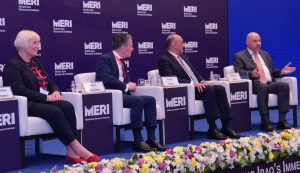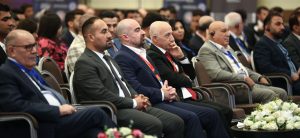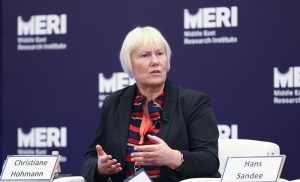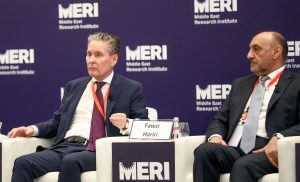Iraq and International Partners: Engagement, Mutual Perceptions, and Shared Visions
This panel discussed mutual perceptions and shared visions between Iraq and its Coalition partners, on challenges and opportunities for collaboration. Ambassador Lukman Faily, led the discussion by inviting insights, perspectives and visions for addressing Iraq’s immediate priorities.
- Christiane Hohmann, German Ambassador to Iraq
- Hans Sandee, The Kingdom of Netherlands Ambassador to Iraq
- Fawzi Hariri, Chief of Staff, Presidency of the Kurdistan Region
- Lukman Faily, The Iraqi Ambassador to Germany (Speaker/Moderator)
The German Ambassador to Iraq, Christiane Hohmann, expressed her feelings “after the first three weeks in this beautiful country” where she found “a huge gap between the perception of Iraq in [their] countries vis-à-vis the perception of Iraq inside the country”. As for Iraq’s priorities, she believed that aside from stability, there needs to be a focus on developing the private sector economy as a core point for Iraq’s progress, citing it as “the job engine that this country needs to actually move forward […], to create the opportunities for young people coming to the labor market in this country”. The Ambassador stressed that “it of course starts in the education sector. How do you train the workforce for the future? What is the economic plan for Iraq? Because hydrocarbon currently being of course the source of revenue but where is the economy going to go? What is going to be the economy of Iraq in 15, 20 years? What is going to be the dominating factor? I think some of these thought processes are very urgent to be done but the next step is also how to actually translate this into concrete action”.
Hohmann stated that although the international community is willing to assist, ultimately Iraq must take initiative for its own sustainable development. “We can assist. We can provide advice. We can tell you what has worked in our countries or what has not worked for us but we cannot do it for Iraq. We need the counterparts here in Iraq to actually do this jointly because otherwise it will not be sustainable.”

Hans Sandee, the Dutch Ambassador to Iraq, built upon the previous points made by Ambassador Hohmann, and delved into the type of engagement they seek with Iraq. He stated that the overarching goal of the Netherlands, EU, and other like-minded countries is to contribute to Iraq’s legitimate and sustainable stability, emphasizing that Iraq’s stability is a cornerstone for the Middle East: “if you have an unstable Iraq, an unstable Middle East, it will immediately have complications and impacts for our own countries.” Sandee noted the positive changes that have occurred in Iraq since 2017-2018, saying that since ISIS has been defeated and other pressing humanitarian crises have been addressed, the international community as well as the Netherlands are looking for a different form of engagement, one that is a ‘two-way street,’ emphasizing the need for commitment and financial contributions from Iraq itself. The focus of the international community will primarily be on capacity building of governmental structures as well as the civil society, aiming to create a sustainable development of Iraq in political, social, and economic aspects. This will allow both Iraq and the international community to aid each other through collaboration rather than donations.
Hans Sandee concluded that the two essential components to long-term stability in Iraq consist of a strong economy and a dynamic civil society. He expressed concern about the shrinking civil society in various parts of Iraq and emphasizes the need to respect and support it. He also expressed the Netherland’s ongoing commitment to supporting the Yezidi community, including efforts towards reintegration of internally displaced persons, providing psychosocial help, and advocating for accountability.

Fawzi Hariri, Chief of Staff in the Kurdistan Region’s Presidency (KRP), shed light on the long-established relationship between the Kurds and the international community, dating back as far as the 50s, 60s, and 70s. He recalled the 50-60 yearlong partnerships with the west that allowed for the success and progress currently seen in Kurdistan in diplomatic, educational, developmental, and infrastructural areas. Hariri highlighted that Iraq’s relationship with the international community was much more limited over the past 20 years when Iraq did not experience the smooth transition that everybody was expecting. He was referring to political instability and other security crises, such sectarian violence, terrorism and ISIS. Hariri then appealed for a fair share of international engagement with the KRG, adding: “it is important for the international community to understand that they need to put into their calculation the share of the KRG as part of any deal they make with Baghdad. It is not enough to have a strategic deal with Iraq, with Baghdad, without highlighting which part of the deal belongs to Kurdistan. We are there. We are engaging. […] For every 10 projects you conduct in the rest of Iraq, we will be expecting at least two of those projects to be in the Kurdistan Region and we are open for that. Our investment laws are open for that”.
The KRP Chief of Staff, Fawzi Hariri, shifted his focus on the priorities in Iraq, and the importance of defining Iraq’s economic and governance systems to address challenges and guide international interactions. Hariri stated that the two important priorities that must be addressed are whether Iraq is a capitalist or a socialist system, and whether Iraq is a federal system or a centralized system. He emphasized that the answer to these two questions determines the type of relationship between Erbil and Baghdad, and the way in which current challenges will be overcome. It will give the international community a clear concept of the way to communicate and invest with Iraq and the KRG.
Ambassador Lukman Faily, cited a metaphor, revolving around whether Iraq is still perceived as the ‘version one’ from the past 20 years or if it has upgraded to ‘Iraq-2.0’ and whether or not they need help from international partners to become Iraq-2.0. He stated that in order for Iraq to be perceived as version 2, it is imperative that Iraq helps the international community with regional stability as well as political reform, correcting misconceptions, and overcoming obstacles such as corruption and human rights concerns. Ambassador Faily emphasized the importance of clear communication with partners and the articulation of a shared vision for ‘Iraq-2.0’ to foster long-term partnerships with Western countries.
Faily then added “the key questions Dr. Fawzi raised are fundamental in relation to the definition of the state, the school of thinking, the philosophy, the economic model, […] unfortunately, our friends in the West cannot help us with that. This is more to do with us Iraqis doing our homework, getting our order. Otherwise, sovereignty will be in question and other aspects will be in question.”

In her further comments, Ambassador Hohmann referred to a meeting between Prime Minister MS Al-Sudani and Bundeskanzler Scholz in January 2023, and a subsequent meeting in September, where they agreed on an ambitious joint work plan focusing on Iraq’s economy. The emphasis of this work plan is on utilizing Iraq’s great potential by creating jobs, generating revenue, and diversifying the economy. Hohmann also focused on addressing the negative perceptions of Iraq, often associated with images of war, and highlighted the importance of bringing in German representatives to experience the country firsthand. “The more we are able to bring in German business representatives, parliamentarians, politicians to actually experience Iraq today, Baghdad and Erbil, the more we actually transfer back people with a different view of this country [rather] than what you traditionally see when you just Google ‘Iraq’.” The challenge lies in changing not only public but also political and economic perceptions for long-term stability. She stressed the importance of long-term stability in fostering an environment where international investors can see conditions as suitable for making money prior to deciding whether or not to invest in the country. She also emphasized the importance of adopting an honest partnership with Iraq, stating “you don’t need the people who gloss things over and give you only the sugar. Sometimes it’s the lemon that helps you actually to move on better.”
Hohmann remarked that the most urgent and crucial element in economic diversification is an improvement in power generation and provision of electricity. “Unless we increase the power generation, the provision of electricity across the country, lots of businesses will not be interested in coming.” While acknowledging the complexity of this task, she expressed a focus on assisting Iraq in becoming more energy independent as a precondition for economic growth.

Ambassador Hans Sandee stated that The Netherlands looks to establish a long-term partnership with Iraq, and that “it’s also good to discuss the challenges. Of course, we would like to see Dutch companies and investors coming to Iraq. But again, we don’t dictate companies to come to Iraq. It’s the companies themselves who make the decision. And for them to come to Iraq, it’s important to have a transparent business climate, no corruption.” He nonetheless proceeded to say that he sees enormous possibilities . Sandee highlighted existing opportunities in agriculture, water management, renewable energy, and migration.
Fawzi Hariri then discussed the challenge of attracting international companies to do business in Iraq. He focused on what makes Iraq unique in comparison to countries with similar resources, such as Kuwait and the UAE, stating “we need to be able to sell ourselves and provide an environment where a businessman will be attracted into coming here. Foreign direct investment needs attraction.” He raised pending issues such as the need to fix financial institutions, address the fall of the Iraqi dinar, and enhance the infrastructure for financial transactions. “We need to provide an infrastructure for our financial institution that gives confidence for international countries and businesses to be able to conduct financial transactions without hesitation.” Hariri then urged Embassies to follow up on the signed agreements, stating: “we need to activate those committees and we need to get Ambassadors in every country to actually follow on implementing the agreements signed by the two ministries.” Additionally, he stressed the importance of including the KRG in economic committees representing Iraq abroad, fostering joint efforts to attract investments without compromising Iraq’s overall share.
In response to Hariri’s question about what Iraq has to offer, Ambassador Sandee emphasized on the importance of human capital, saying: “one thing that strikes me after one year in Iraq is that I see so many talented young people in both the KRI and in federal Iraq, very clever, far more intelligent than I am, doing a lot of great things. And what the Netherlands want to do is to tap that potential. We have several programs like Orange Corners but in essence what we want to do is to give them a chance in order to use the full potential of Iraq.” He highlighted the effectiveness of connecting these individuals to universities and the government, employing a triple model that involves collaboration between academia, the government, and the private sector. The overarching goal is to provide opportunities for the young generation to foster innovation and prevent migration.
On the KRG relations with Baghdad, Fawzi Hariri noted that working through Baghdad has become easier over the years with a more responsive Prime Minister and Cabinet, stating, “we believe [Prime Minister Al-Sudani] is a genuine person…. He wants to assist. Obviously, there are certain limitations which we understand, but the KRG, the government, presidency, and political parties), still fully support his vision of the new Iraq. […] By no means is everything smooth, there are bumps on the road, but I think we are at the moment on the right road.” He affirmed his acknowledgement for the normalcy of political differences by drawing parallels between similar situations in the US and elsewhere. Regarding delayed salaries for the KRG employees, Hariri stated “our challenges with Baghdad should not be minimized to paying salaries. We have a far more strategic role to play if we are to have a more stabilized, prosperous Iraq.”
MERI Forum 2023
Addressing Iraq’s Immediate Priorities
10 & 11 October, 2023
Session 11: Iraq and International Partners: Engagement, Mutual Perceptions & Shared Visions (B)
Session Video

